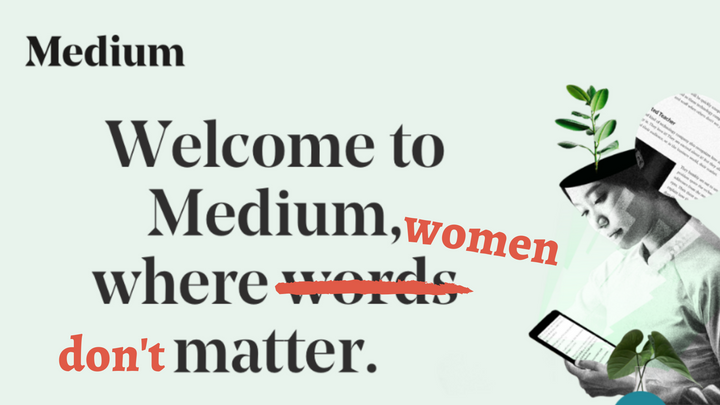My Feminism is for the Women Who Hate Me Most
Insights from Andrea Dworkin help me understand anti-feminist women.

There is one quote that guides my feminism:
“Feminism is a political practice of fighting male supremacy on behalf of women as a class, including all the women you don’t like, including all the women you don’t want to be around, including all the women who use to be your best friends whom you don’t want anything to do with any more. It doesn’t matter who the individual women are.” - Andrea Dworkin
When you are fighting for women’s liberation, you will make enemies. Many of those enemies will be women.
This is often surprising to new feminists — why would a woman fight me on this? Why would she disagree with me against her own interest? We think that if we just educate our lost sisters, raise their consciousness, they will inevitably come around.
But it doesn’t always work that way.
Why Do Anti-Feminist Women Exist?
As I previously discussed, feminist writers like Andrea Dworkin and Dee L. R. Graham have provided insight into the phenomenon of anti-feminist women.
Under patriarchy, women live in a constant state of terror at the hands of men. We are raped, abused, bought and sold, and killed by them. Our fathers, husbands, brothers, pastors, bosses, and eventually even sons are able to control us through physical terror and women, denied the required resources, have little means of fighting back.
In her 1978 book, “Right-wing Women,” Dworkin lays out an explanation for the apparently self-sabotaging behavior of anti-feminist women as a selfish, yet adaptive, tool for survival.
“She will save herself by proving that she is loyal, obedient, useful, even fanatic in the service of the men around her.”
Patriarchy rewards women who conform, keep their heads down, and don’t push back. Women who fail to conform or cause too much trouble are swiftly punished. Many women are forced to decide between saving themselves and standing up for women as a whole. When it feels like your very survival, or the survival of your children, is on the line, it’s no surprise that many people choose to save themselves.
In fact, we all save ourselves many times a day.
We save ourselves when we go to work at our capitalistic job doing things we know don’t contribute good into the world so that we can bring a paycheck home.
We save ourselves when we drive a car to that job, even though we know it’s bad for the environment.
We save ourselves when we buy our household goods on Amazon because going out and shopping for it is just too inconvenient, even though we know how evil the company is.
We save ourselves when we use medicine that was tested on animals, because we know we need it to live.
Choosing to save yourself and your family over fighting an uphill battle is a logical choice, even if it’s not the right one. For the women who resist feminism and fight against our attempts to liberate them, understanding that they are not stupid but sometimes making an intentional choice is essential for maintaining compassion.
“In effect, she ransoms the remains of a life — what is left over after she has renounced willful individuality — by promising indifference to the fate of other women.”
In this way, women are forced to fight selfishly to survive, preventing us from joining together as a sex-class to rise up against our oppressor. Of course, no amount of throwing other women under the bus truly offers protection from male violence, but this is psychologically damaging to accept.
Societal Stockholm Syndrome
Dee Graham, author of “Loving to Survive,” describes the psychological impact of male terror on women as “Societal Stolkholm Syndrome,” recognizing that female adherence to patriarchy is not always a conscious decision, but a subconscious one — still for their own safety and protection.
Stockholm Syndrome has been observed to occur in situations where hostages adapt by learning to empathize with their captors. While it may seem like hostages would do the opposite, empathizing with the captor is important since it increases the hostage’s ability to do one thing that is vital for survival: decrease the captor’s antagonism towards the hostage. In extreme cases, the captors themselves may even feel connection and attachment to the hostage if there are sufficient opportunities for bonding. This is useful to the hostages, as it offers them reassurance that they will not be killed.
Patterns similar to Stockholm Syndrome have also been found in situations of abuse and domestic violence. Victims of domestic violence learn to not only predict the abuser’s behavior but often find themselves empathizing with him. This is not “fake” empathy or acting. The victim truly does empathize with the abuser’s point of view. This is how they learn to understand and navigate him, and how they survive.
According to Graham, this pattern of abuse → empathy → survival has happened to women on a massive scale: Societal Stockholm Syndrome.
Empathizing with patriarchal ideals is not just an act that women put on to deflect male violence or gain access to their inner sanctum for sabotage — it is an adaptive tool that has helped women survive for centuries.

Standing Up For Women Who Hate Me
When we understand the reasons why women may fight against our efforts to liberate them, it is easier to maintain compassion for all women, regardless of political or personal differences.
My feminism is for right-wing women who call me names and laugh at my work, claiming “we are not victims!”
My feminism is for my former roommates, who called me hateful because I believe that women can not escape their oppression by attempting to identify out of it.
My feminism is for my coworkers who turned on me when my feminism was inconvenient, even as I fought for their right to be treated fairly in the workplace.
My feminism is for the women who have kicked me out of groups and shunned me because they are afraid they will be guilty by association in the watchful eyes of the patriarchy.
My feminism is even for the other feminists who have attacked me online, used patriarchal slurs against me, and attempted to destroy my work.
You are all still my sisters, and I know that you need liberation more than most. So whether you hate me or not, my feminism is for you.
The generous support of our readers allows 4W to pay our all-female staff and over 50 writers across the globe for original articles and reporting you can’t find anywhere else. Like our work? Become a monthly donor!
Enter your email below to sign in or become a 4W member and join the conversation.
(Already did this? Try refreshing the page!)





Comments